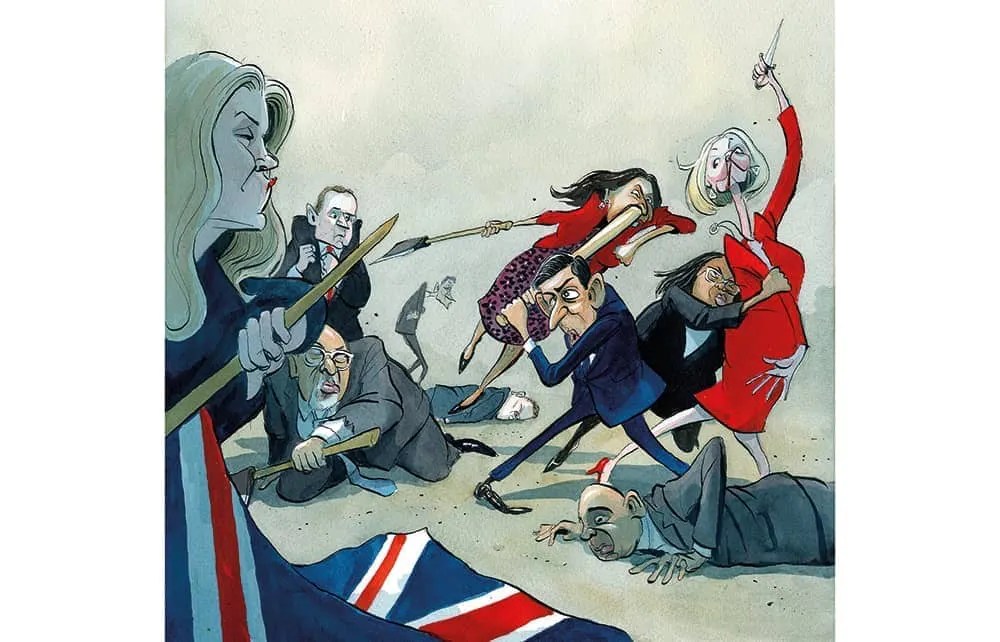Liz Truss is not quite the shortest-serving prime minister in history. George Cunning has that prize because he died while he was in office. But for somebody who is still alive, at least, this is the shortest running term.
If MPs can whittle the number of candidates down to two by, let’s say, Tuesday the question that some of the party officials are currently trying to work out is whether the Conservative party has the ability to run an effective online ballot within a couple of days. That’s pretty much the only way of doing it. That obviously raises the question that there will be some members who don’t necessarily have access to the internet or at least are not very familiar with it – it is a relatively older section of the population.
Will Boris Johnson try to run? I think we should remember at this point: Mr Johnson still has the enquiry by the committee on standards hanging over him on whether or not he misled the House of Commons about partygate. Tory MPs might be very wary of jumping back into having Mr Johnson in office and then finding themselves embroiled in exactly the same arguments about his probity from which they thought they had escaped when he was brought down at the beginning of July.
Will it be possible for whoever succeeds Liz Truss to be able to maintain the confidence of House of Commons?
If Johnson isn’t going to be a credible runner, then it’s going to be between Rishi Sunak, Penny Mordaunt and Suella Braverman – she made it pretty clear yesterday that she would run. Given how she performed the first time around, Suella Braverman is the one that will fall out. Then the question is: can Rishi Sunak win against Penny Mordaunt a second time around? Penny Mordaunt will be formidable competition because she is somebody who appeals partly to the centre of the party, who might otherwise be backing Sunak. She is also the one who the Trussites, many of whom will be unhappy about what has happened, might be willing to switch to.
Doubtless Sunak will be wanting to remind Tory members and MPs that he did warn that this is exactly what would happen. He will obviously be hoping that, having made it clear during the last leadership contest, he might now get rewarded for what he has said.
Whoever wins, they should enjoy the next two years because that is probably the length of their tenure. It is probably going to be pretty difficult because they are going to be leading a fractious party which is not necessarily going to make their life very easy. That’s going to be true whoever gets it.
The truth is parties and governments that preside over a fiscal crisis have nearly always struggled at the ballot box. The Labour party after 1948, the Labour party after 1967, Labour after 1976, the Conservatives after Black Wednesday in 1992 and Labour after the financial crisis of 2008. All of these governments did not remain in office for very long thereafter. I suspect that’s probably going to be the fate of this government. But of course, many individual Tory MPs will be hoping that the party recovers from being as much as 30 points behind in the polls, which is where they are at the moment, because if that were to be the result then the majority of Tory MPs would be out on their ear.
This is the first time since the parliament of 1935–1945, which was extended because of the second world war, where we have had more than one change of prime minister within the parliament. Before that, you have to go back to the middle of the 19th century. This is a novel experience but in the end we have a parliamentary democracy; as long as somebody can maintain the confidence of the House of Commons then they will be able to avoid a general election.
Will it be possible for whoever succeeds Liz Truss to maintain the confidence of House of Commons? Or will the divisions inside the Conservative party be so great that we eventually discover that there isn’t anybody in the current parliament who can maintain the confidence of the House? If so, we might be precipitated into an early general election. That certainly has to be in the back of Tory MPs’ minds as they try to work out who to back and under what conditions.
This is an edited extract from an interview given by Sir John Curtice to BBC News






Comments